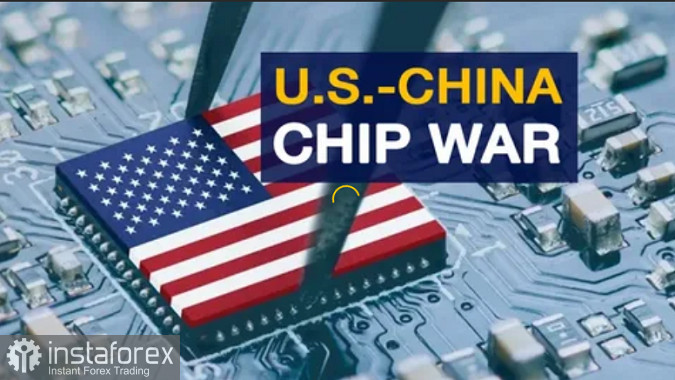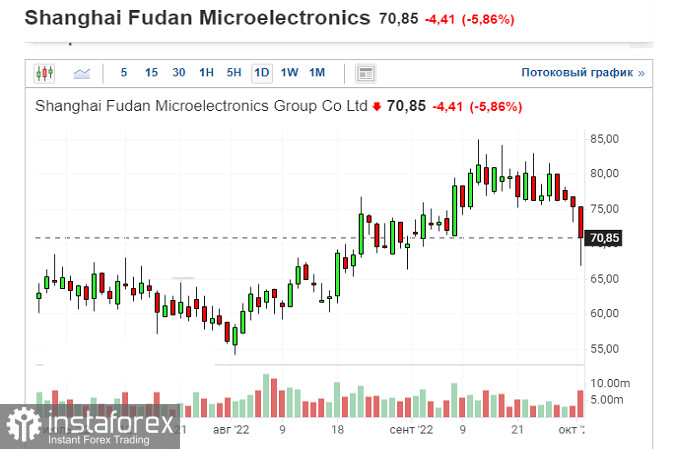
The Biden administration is imposing restrictions on technology exports to China that could undermine the country's ability to develop wide swaths of its economy, from semiconductors and supercomputers to surveillance systems and advanced weapons.
On Friday, the US Commerce Department unveiled tough restrictions on selling semiconductors and chip-making equipment to Chinese customers, undermining the country's efforts to build its own chip manufacturing industry. The agency also added 31 entities to its unverified list, including Yangtze Memory Technologies Co. and a subsidiary of leading chip equipment maker Naura Technology Group Co., severely limiting their ability to buy technology from abroad.
These moves are the most aggressive on the part of the Biden administration yet. The White House seeks to prevent China from developing technological capabilities it sees as a threat. Depending on how broadly Washington enforces these restrictions, the impact could extend far beyond semiconductors and into industries that rely on high-power computing, from electric vehicles and aerospace to simple gadgets like smartphones.
Chinese state media and officials vehemently raged against the action over the weekend, warning of the economic impact and fueling rumors of possible retaliation. He Xiaopeng, chairman and CEO of Chinese electric car maker Xpeng Inc., said last month that tightening US restrictions on chip exports would set back the country's automotive sector.
According to Dylan Patel, chief analyst at SemiAnalysis, the two countries are now officially in an "economic war". A Chinese analyst said there was no more "possibility of reconciliation".
"This is the US salvo against China's efforts to build its domestic tech capabilities," Patel noted. He estimated that the restrictions could cut global technology and industry trade by hundreds of billions of dollars. "It's the US firing back, making clear they will fight back," the analyst added.
Stocks of European and Chinese semiconductor makers collapsed amid the news. Shares of ASML Holding NV, the most advanced manufacturer of equipment for producing semiconductors, slid by over 3%. Semiconductor Manufacturing International Corp. fell by 5.2% in Hong Kong on Monday, notching the steepest drop since August 15, since Bloomberg Intelligence analyst Charles Shum downgraded its 2023 growth estimate by 50%. Hua Hong Semiconductor Ltd. lost 10%, while shares of Shanghai Fudan Microelectronics Group Co. dipped by 25%. Naura dropped by its daily limit of 10% in mainland China, posting the biggest decline since April.

According to US officials, the new restrictions are necessary to prevent China from becoming an even bigger economic and military threat. They are seeking to ensure that the country's chip makers do not develop advanced semiconductors.
China's foreign ministry spokesperson Mao Ning said the measures were unfair and would "deal a blow to global industrial and supply chains and world economic recovery."
"The reality is the US is determined to use chips as a tool to contain China," Gu Wenjun, head of Chinese chip researcher ICwise, wrote. "There is no possibility of reconciliation."
In general, the new US regulations limit chipmakers from selling to China artificial intelligence semiconductors and those that could be used for supercomputers. Nvidia Corp. warned in September that government restrictions on AI chip exports to China could significantly trim its revenue, which in turn would lead to a collapse in shares.
Chip manufacturers can request an exception from the Department of Commerce from these rules. But they must assume that such requests will be denied, senior officials said.
Chip makers can request a Commerce Department to provide an exception to these guidelines. However, such requests would probably be denied, senior officials noted.
Stacy Rasgon and Sanford C. Bernstein explained the restrictions on AI, supercomputers, and advanced chip-making equipment, while pointing out that standard processors used in personal computers and servers would not be blocked from exporting to China, as some had feared.





















